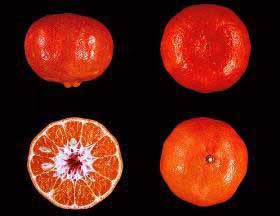




Somehow it happens that every year tangerines become the first sign of the approaching New Year for us. They appear in all stores, attracting us with their bright skin and inviting aroma. But as soon as you try one tangerine, the whole package becomes empty in an instant. Why does this happen?
To begin with, we will understand what “tangerines” are. And so, “mandarin” is the fruit of a citrus shrub. But not all that is sold in our supermarkets is tangerines, often hybrids: Mandarin + grapefruit = tangerine - a smaller orange, with an easy-to-clean skin.

Mandarin + grapefruit = natsumikan - a sweetish taste.

Mandarin + orange = tangora - bright orange pulp, sweet taste, flattened shape.

Mandarin + wild lemon = citrandarin - a relatively sour taste.

Mandarin (Satsum) + Ichang = Ichandarin - also sour, but has small sizes.

Mandarin + kumquat = calamondine - very small tangerines.

Mandarin + orange-bead = clementine - very sweet - the most common.

Why do so many of us love these citrus fruits so much? The answer is simple: they are very useful, which is why the body requires! Beneficial features: 1. An excellent source of vitamin C and magnesium 2. Mandarins are a decongestant 3. Very useful in diabetes - lower blood sugar 4. The essential oil from this citrus is uplifting 5. At temperature, tangerines act as a natural antipyretic 6. Regular consumption of tangerines improves metabolic processes in the body 7. They improve appetite very well 8. For colds, decoctions from the peel of tangerines have a positive effect on expectorant processes 9. For cosmetic purposes, the fruits can be used for skin diseases (acne and some fungi) 10. And tangerine oil is a very popular anti-cellulite remedy.

But it should be remembered that there are exceptions to the rules. For example, pregnant women can eat only 1-2 tangerines per day, and if more, this will cause diathesis in the unborn child. And the use of these fruits in significant quantities is undesirable for those who have diseases of the gastrointestinal tract (gastritis in the acute stage, ulcer, colitis, etc.)
Interesting: in 1 kilogram of these fruits - 380 calories (about 38 calories in 1 mandarin), so mandarin diets are becoming more popular.





